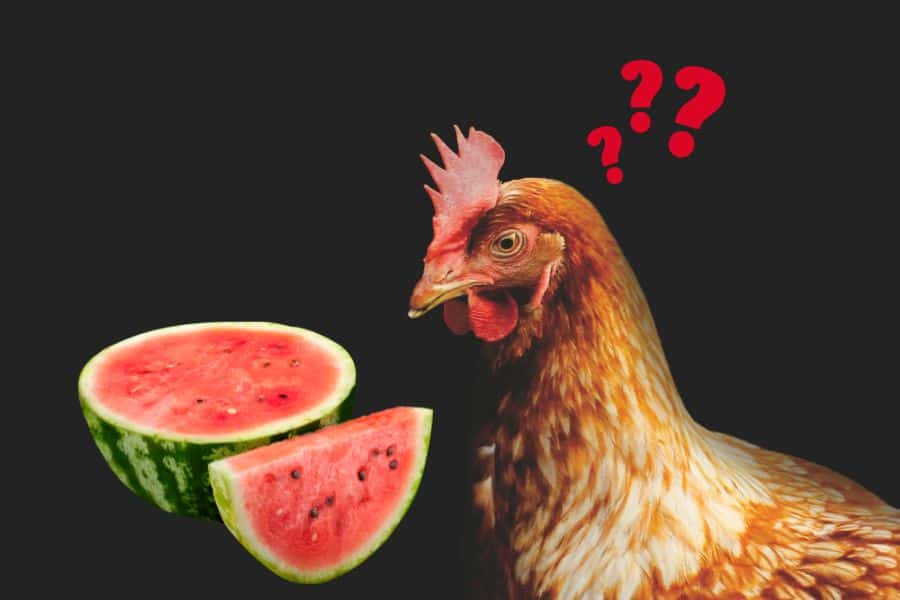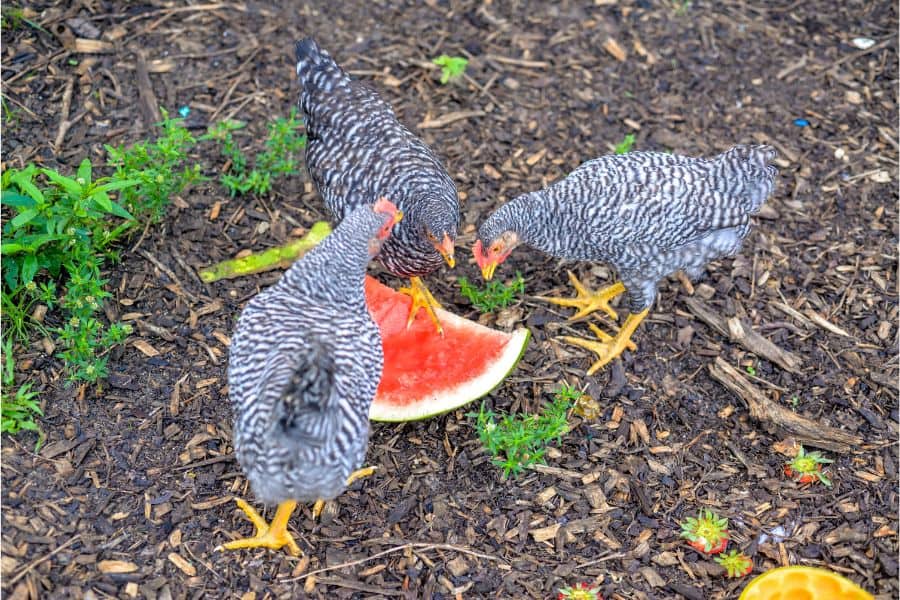To have a healthy flock and improve the productivity of chickens, you need to choose the right food and supplements that contain nutrients, minerals, and vitamins necessary for growth and weight.
The more diverse the food, the healthier and stronger your flock’s immune system.
It is important to emphasize that the chicken diet differs between summer and winter.

During the warm period of the year, chickens like to nibble on green clover, grass, weeds of succulent and delicious plants, all garden waste, as well as kitchen waste from fruits and vegetables. One of their favorite summer treats is cold, sweet, juicy watermelon.
Let’s examine why watermelon is considered nutritionally valuable and a healthy snack for your chickens!
What is in Watermelon?
Watermelon is a succulent fruit that grows well in hot climates. Its sweet, juicy, reddish flesh is very tasty. It is also a great refreshment from the summer heat for us and obviously for the chickens too!
Watermelon is rich in all kinds of good ingredients that positively affect the body. It is primarily eaten on its own but can also be mixed with other fruits. Since it contains some fiber and is rich in vitamins, minerals, and antioxidants, watermelon is considered an extremely valuable food.
The energy value of 100 g of watermelon is low and amounts to 30 kcal / 127 kJ. It contains:
- 7.55 g of carbohydrates
- 0.61g of protein
- 6.20 g of sugar
- 0.15% fat
Watermelon also contains essential minerals:
- calcium (7 mg)
- iron (0.24 mg)
- magnesium (10 mg)
- phosphorus (11 mg)
- zinc (0.1 mg), copper (0.04 mg)
- manganese (0 .04 mg)
- fluoride (1.5 μg)
- selenium (0.4 μg)
As for vitamins, as a necessary part of your chickens’ diet, watermelon provides:
- vitamin C (8 mg)
- thiamin (0.03 mg)
- riboflavin (0.02 mg)
- niacin (0.2 mg)
- pantothenic acid (0.2 mg)
- vitamin B6 (0.05 mg)
100 g of watermelon also contains 0.4 g of dietary fiber, 4.5 mg of lycopene, and 303 mg of beta-carotene.
Even 92 percent of watermelon is water which contributes to the hydration of the body.
Is Watermelon Good for Chickens?
The answer to this question is definitely yes!
Watermelon is not only one of the chickens’ tastiest snacks but is also one of the most beneficial ones. It’s good for chickens for several reasons, and these are some of them:
Watermelon Helps with Hydration
Heat stress and dehydration can become serious issues for your chickens during hot summer. When temperatures exceed 90, chickens cannot lose excess heat fast enough to maintain proper body temperatures and risk becoming dehydrated. Their bodies are comprised of 70% water, and the loss of even 10% can result in death.
Water is extremely important for the proper functioning of the chickens’ bodies. Watermelon, with its high water content, contributes to the easier intake of a sufficient amount of liquid during the day.
Watermelon Helps With Digestion
Watermelon contains a high proportion of water and a small proportion of fiber, which together contribute to improving your chickens’ digestion. Water softens food in the crop and helps the digestive tract to work more easily, while fiber helps to have regular stools.
An interesting component of watermelon is the amino acid citrulline which also improves digestion and increases the health of the digestive system by reducing harmful bacteria in the gut.
Watermelon Improves Heart Health
Heart diseases are the leading cause of chicken deaths, especially those in confinement, lacking necessary activity, and gaining weight. However, choosing chicken feed that positively affects heart health reduces the risk of developing heart and circulatory system diseases.
Several nutrients found in watermelon are associated with reducing the risk of developing these diseases.
Citrulline increases nitric oxide levels, which in the chickens’ body helps dilate blood vessels, consequently reducing the risk of heart disease.
Minerals such as potassium and magnesium and vitamins such as vitamin A also help protection of your chickens’ hearts.
Lycopene, as one of the very effective antioxidants, protects the cardiovascular system of your chickens’ as well.
Watermelon Reduces Inflammation and Oxidative Stress
Lycopene and vitamin C, as powerful antioxidants, prevent the harmful effects of free radicals on the chicken’s body by neutralizing them.
This way, they help reduce oxidative damage and inflammatory processes in the body and help chickens to fight possible inflammation.
Watermelon Improves Physical Performance
Citrulline, one of the amino acids from watermelon, helps reduce muscle fatigue, while the calcium in its seeds encourages chickens’ bone strength. That’s why watermelon is very beneficial for chickens that roam around the yard freely because it helps the improvement of their physical performance.
Waterlemon is extremely rich in lycopene. It is a phytonutrient from the carotenoid family that reduces the risk of developing muscular degeneration.
At What Age Can Chickens Eat Watermelon?
Chickens have a very good digestive system and can easily digest various foods. Still, you must be careful about what you feed your chickens and at what stage of their life.
Since it is soft and fleshy, adding a few watermelon dice to your baby chicks’ diet as soon as they are two weeks old is perfectly safe.
A nutritionally balanced ration is necessary throughout their life, and treats such as watermelon should be only given in moderation.
Can Chickens Have Watermelon Rind?
Since it is not as tasty or juicy as the red insides, watermelon rind or skin is probably not the chicken’s favorite part of this fleshy summer treat. But along with the insides and the seeds, it is also edible.
Moreover, it is one of the most nutritious parts of this fruit. Citrulline from watermelon rind reduces chickens’ body temperature improves their heat tolerance, and helps them to cool during hot summer days.
So, never through watermelon rind away after treating yourself to this refreshing fruit, for it is very beneficial for your chickens’ health!
Pay attention to one more thing while feeding the watermelon rind to the chickens! If you use the watermelon from the market, wash it well to protect your chickens from the harmful effects of pesticides that might have been used.
Can Baby Chickens Eat Watermelon?
Definitely!! It is safe, and your baby chicks will enjoy eating watermelon as much as the adult chickens do! They will be happy eating every part of it!
However, the manner of feeding watermelon to baby chicks might be slightly different. The inside of the watermelon is fleshy and soft and easy for baby chickens to peck on, so you can safely serve it to your chicks sliced or diced.
When it comes to the watermelon rind, which is its hardest part, it would be best to chop it into tiny pieces before letting your baby chicks feast on it.
But pay attention to the quantity you are giving. Due to its high water content, watermelon gives a feeling of satiety because it “efficiently” fills the stomach, and you don’t want your chickens to lack other important nutrients in their feed.
So, a few bites of the treat, combined with starter feed, will be perfect!
Do Chickens Like Watermelon Seeds?
In addition to the fleshy part, the chickens’ favorite part of the watermelon, its seeds are also edible and perfectly safe for your chickens to eat.
Unlike the seeds of some other fruits, watermelon seeds are rather small and are not difficult to consume and digest. Chickens gobble them up very quickly.
Containing around 25% protein, calcium, potassium, iron, antioxidants, manganese, magnesium, and vitamins A, B, and C, they are an exceptionally healthy source of nutrition.
A powder made from watermelon seeds boosts natural metabolism and improves chicken growth and the number of eggs they produce.
Watermelon seed coating contains cucurbitacin, which is a natural dewormer. It paralyzes worms, stops them from multiplying, and helps clean chickens’ digestive tracts.
However, as with all other types of treats, you should ensure that the amount of watermelon seed in your chickens’ diet is not higher than 10% of their feed.
How to Feed Watermelon to Chickens?
Chickens will love pecking on watermelons in any shape and form during hot summer days, and you can serve them in several ways.
You can simply feed adult chickens a whole watermelon since they can easily peck through the rind, which is the hardest part of the fruit.
Cut in half or sliced watermelon is the best way to feed smaller hens and baby chickens. They will not have to fight the hard rind to get to its soft and juicy part and will have the seeds and flesh right at their disposal.
You can also mix watermelon with chicken feed. It will give the feed a sweet and juicy taste, and your chickens will be glad to have it.
If you feel like getting creative, you can prepare refreshing watermelon soup by blending watermelon insides and a few ice cubes.
Frozen watermelon pieces are another way of serving this treat to your chickens. They are a great refreshment that will help your chickens cool down. Pecking at the icy cubes will also keep them busy and entertained!
Also Read:
Conclusion
The answer is clear if you wonder whether you should give your flock watermelon! Yes, you definitely should!
Watermelon is a perfect summer treat for your chickens. Its high water content greatly contributes to your chicken body’s hydration during hot months.
It stands out from other fruits since every part is edible. Packed with vitamins, minerals, and antioxidants, it has many health benefits for your chickens, but like all other treats, it must be given in moderation.

